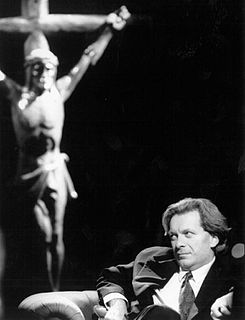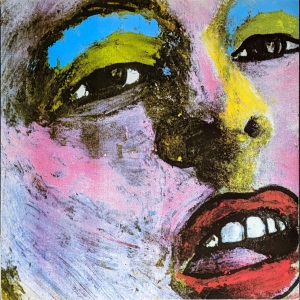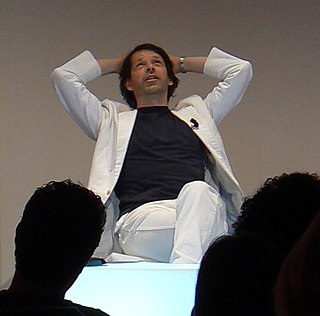
Factory Records was a Manchester-based British independent record label founded in 1978 by Tony Wilson and Alan Erasmus. The label collapsed in 1992 and was bought by London Records.
Madchester was a musical and cultural scene that developed in the English city of Manchester in the late 1980s, closely associated with the indie-dance scene. Indie-dance saw artists merging indie music with elements of acid house, rave music, psychedelia and 1960s pop. The term Madchester was coined by Factory Records' Tony Wilson, with the label popularised by the British music press in the early 1990s, and its most famous groups include the Stone Roses, Happy Mondays, Inspiral Carpets, the Charlatans, James and 808 State. It is widely seen as being heavily influenced by drugs, especially MDMA. At that time, the Haçienda nightclub, co-owned by members of New Order, was a major catalyst for the distinctive musical ethos in the city that was called the Second Summer of Love.

The Haçienda was a nightclub and music venue in Manchester, North West England, which became famous during the Madchester years of the 1980s and early 1990s.

Happy Mondays are an English rock band formed in Salford in 1980. The band's original line-up was Shaun Ryder (vocals), his brother Paul Ryder (bass), Mark Day (guitar), Paul Davis (keyboard), and Gary Whelan (drums). Mark "Bez" Berry later joined the band onstage as a dancer/percussionist. Rowetta joined the band as a vocalist in 1990.

Anthony Howard Wilson was a British record label owner, radio and television presenter, nightclub manager, impresario and a journalist for Granada Television and the BBC.

24 Hour Party People is a 2002 British biographical comedy-drama film about Manchester's popular music community from 1976 to 1992, and specifically about Factory Records. It was written by Frank Cottrell Boyce and directed by Michael Winterbottom. The film was entered into the 2002 Cannes Film Festival to positive reviews.

Mark Berry, better known as Bez, is an English percussionist, dancer, and media personality. He is best known as a member of the rock bands Happy Mondays and Black Grape.

Shaun William George Ryder is an English singer-songwriter, television personality and author. As the lead singer of the Happy Mondays he was a leading figure in the Madchester cultural scene in the late 1980s. In 1993 he formed Black Grape, with Happy Mondays dancer Bez.

Squirrel and G-Man Twenty Four Hour Party People Plastic Face Carnt Smile was the first album by British band Happy Mondays. It was released in 1987 on Factory Records and was produced by John Cale. The album features many characteristics that would be further developed on the band's second LP Bummed, such as Shaun Ryder's seemingly nonsensical lyrics combined with funk rhythms.

Bummed is the second album by English alternative rock band Happy Mondays, released in November 1988 on Factory Records. Produced by Martin Hannett, the album was recorded over six weeks in Driffield's Slaughterhouse recording studio. The sessions were noted for heavy drug use by the band and Hannett, particularly the rave drug ecstasy.

Pills 'n' Thrills and Bellyaches is the third studio album by English alternative rock band Happy Mondays, released on 5 November 1990 by Factory Records. The band chose British DJ Paul Oakenfold and his frequent collaborator Steve Osbourne to produce the album based on their work on various remixes for the band's previous singles. It was recorded at Eden Studios in London throughout 1989 and early 1990.

Manchester Central Convention Complex is an exhibition and conference centre converted from the former Manchester Central railway station in Manchester, England. The building has a distinctive arched roof with a 64-metre span - the second-largest railway station roof span in the United Kingdom, and was granted Grade II* listed building status in 1963.

...Yes Please! is the fourth studio album by British band Happy Mondays, released in 1992. It was their final album recorded on the Factory Records label; the album's high recording costs and commercial failure would end up driving the record label bankrupt just two months after its release.

Peter Andrew Saville is an English art director and graphic designer. He came to prominence for the many record sleeves he designed for Factory Records, which he co-founded in 1978 alongside Tony Wilson and Alan Erasmus.
Manchester's music scene produced successful bands in the 1960s including the Hollies, the Bee Gees and Herman's Hermits. After the punk rock era, Manchester produced popular bands including Joy Division, New Order, the Smiths and Simply Red. In the late 1980s, the ecstasy-fuelled dance club scene played a part in the rise of Madchester. In the 1990s, Manchester saw the rise of Britpop bands, notably Oasis.
Mike Pickering is a British musician and DJ, associated with the "Madchester" scene.

The Culture of Manchester is notable artistically, architecturally, theatrically and musically. Despite being the 5th largest city in the United Kingdom by population and the second largest conurbation, Manchester has been ranked as the second city of the United Kingdom in numerous polls since the 2000s (decade), with an influential culture scene helping to elevate Manchester's importance in the national psyche. This has helped the city's population grow by 20% in the last decade, and made the universities the most popular choices for undergraduate admission.
Kevin Cummins is a British photographer known for photographs of rock bands and musicians including Mick Jagger, Ian Curtis, Joy Division, Morrissey, Courtney Love, Patti Smith, George Clinton, Thomas Dolby, and David Bowie.

Art of the Title (AOTT) is an online publication dedicated to title sequence design, spanning the film, television, conference, and video game industries. The publication is both an educational and historical resource and a contemporary publication, focusing on the creative process behind the design of title sequences. It combines interviews with filmmakers and directors, designers, and craftspeople with in-depth analyses and behind-the-scenes materials.

Angry Indian Goddesses is a 2015 Indian Hindi-language drama film directed by Pan Nalin and produced by Gaurav Dhingra and Pan Nalin under the banner Jungle Book Entertainment. It stars Sandhya Mridul, Tannishtha Chatterjee, Sarah-Jane Dias, Anushka Manchanda, Amrit Maghera, Rajshri Deshpande, and Pavleen Gujral with Adil Hussain. It was screened in the Special Presentations section of the 2015 Toronto International Film Festival, where it finished second for the People's Choice Award.















